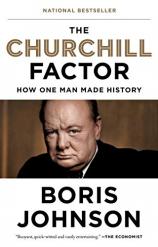The Churchill Factor: How One Man Made History
Review
The Churchill Factor: How One Man Made History
There are those who believe that Winston Churchill saved the world. Boris Johnson, an English journalist (editor of The Spectator) and a politician (Mayor of London and MP in the House of Commons), is one of them.
The “Churchill factor,” as conceived by Johnson, is a body of evidence, myth and a touch of mesmerism that demonstrates, for a new generation, that not only Britons but all Western Europeans and, arguably, all Americans owe a debt of gratitude to the scrappy, plump little man who steered the English-speaking peoples on a course to vanquish Hitler, the Nazis and all they stood for. It was never simple. For a start, many in the English royal family had ties to Germany and sympathies for the Fürher, and many in the Parliament were, frankly, wimpy on war.
"With the 50th anniversary of the great man’s death upon us, THE CHURCHILL FACTOR is well timed to provoke discussion, perhaps in one of the many pubs that bear the Churchill name."
Lucky for them, Churchill was not; often referred to as a “warlord,” he had a clear eye to what he believed was right and a determination never to surrender, which had helped him overcome depressive moods and a noticeable lisp in his early years. Churchill was more than just a leader “type” --- he was an orator, a Nobel Prize-winning writer, a phrase-maker whose wit sliced fine (though more bon mots have been attributed to him than he probably gave voice to), and could drink most men under the table.
As the struggle against Hitler became more uphill and the stakes more crucial, by means of boyish charm, intellectual brilliance and well-plotted histrionics, Churchill inveigled the powerful Americans into the war (he was later to say that “no lover ever studied the whims of his mistress as carefully” as he studied Franklin Roosevelt). Johnson describes his speech to Congress: “He invokes the memory of his [American] mother; he quotes the Psalms; he appeals to God,” all as he “hammers the air…clasps his lapels…glowers and scowls.”
Johnson has composed not a detailed bio, but rather an appeal to a younger audience, with relaxed prose and a bit of modern slang, to re-invent and re-idolize his subject. He assays that Churchill may have been a bit of a bully (“he never took a bus in his life” and “was never so happy as when a servant was pulling on his socks”). Yet he escaped from a prisoner of war camp; “rolled up his sleeve and offered a skin graft” to a friend injured in the Boer War; was shocked when he learned, secondhand, how poor his fellow countrymen were and resolved forthwith to improve their conditions. And if he was a bit anti-feminist, by 1955 he was championing equal pay for women in education and government.
There have been many well-known men who influenced the world negatively, but few who, like Churchill, made a real, enduring, positive difference in the course of history. Johnson would go further, concluding that Churchill and his influence are unique, that there has “never been anyone remotely like him before or since.” With the 50th anniversary of the great man’s death upon us, THE CHURCHILL FACTOR is well timed to provoke discussion, perhaps in one of the many pubs that bear the Churchill name.
Reviewed by Barbara Bamberger Scott on November 21, 2014
The Churchill Factor: How One Man Made History
- Publication Date: October 27, 2015
- Genres: History, Nonfiction, Politics
- Paperback: 400 pages
- Publisher: Riverhead Books
- ISBN-10: 1594633983
- ISBN-13: 9781594633980




